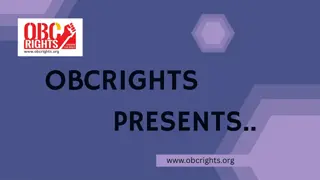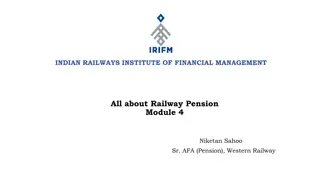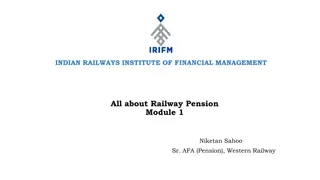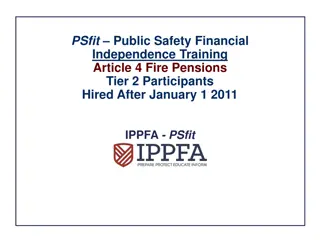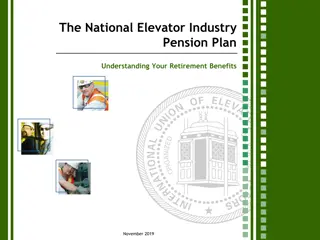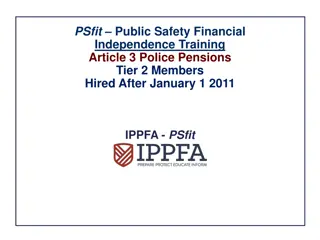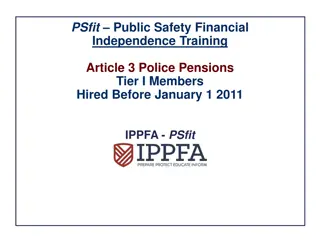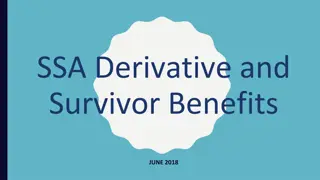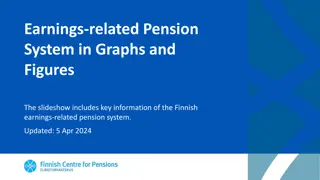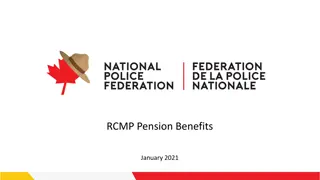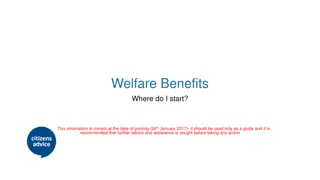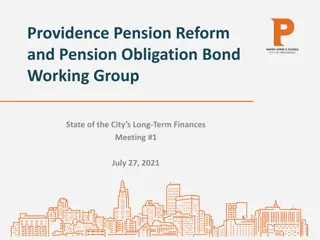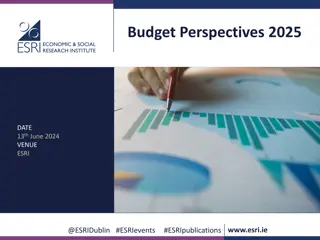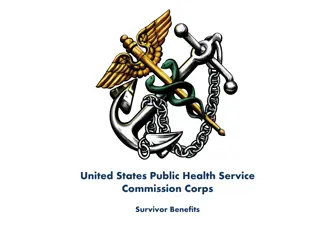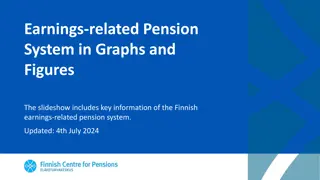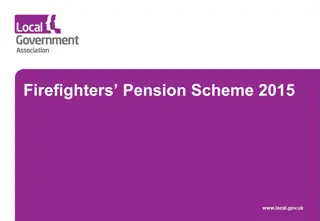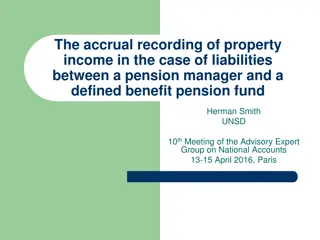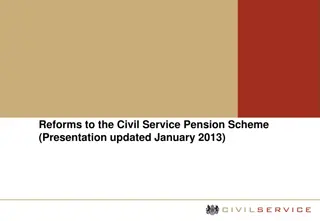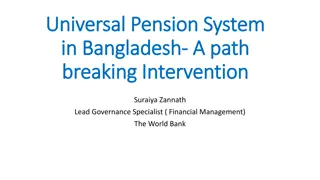Understanding VA Pension and Survivor Benefits
Learn about the various VA pension and survivor benefits available to wartime-era veterans and their families. Discover the eligibility criteria, income and net-worth limitations, and additional allowances under the Aid & Attendance program. These benefits aim to provide financial support to those in need and help veterans cope with financial challenges.
Download Presentation

Please find below an Image/Link to download the presentation.
The content on the website is provided AS IS for your information and personal use only. It may not be sold, licensed, or shared on other websites without obtaining consent from the author. Download presentation by click this link. If you encounter any issues during the download, it is possible that the publisher has removed the file from their server.
E N D
Presentation Transcript
2018 IDVA SPRING CONFERENCE & TRAINING Creating a Bridge for Our County Veterans and the State/Federal Department of Veterans Affairs
PENSION AND DEPENDENCY & INDEMNITY COMPENSATION (DIC) BENEFITS BY: CAMERON LOCHNER NORTHEAST INDIANADISTRICT SERVICE OFFICER 2
VA Benefits: An Overview NON-SERVICE-CONNECTED PENSION & SPECIAL MONTHLY PENSION PROGRAMS
Commonly Referred to as Pension, Widow s Pension, Death Pension, Survivor s Pension, and .. Aid & Attendance???
What is Non-Service-Connected Pension & Survivor s Pension? 5
What is Non-Service-Connected Pension & Survivor s Pension? o The Non-Service-Connected Pension & Survivor s Pension benefit is a BasicMonetary Benefit paid to Wartime-Era Veterans who have Limited Income and Net-Worth. This benefit helps Veterans and their families cope with financial challenges by providing Supplemental Income through the Pension and Survivors Pension benefit programs. o Veterans who are more seriously disabled may qualify for an additional allowance with the Aid & Attendance or Housebound Program benefits. o Again ..this is a Needs-Based benefit with Income and Net-Worth limitations.
Three Categories to in Which to Qualify (BASIC & SPECIAL MONTHLY PENSION)
Basic & Special Monthly Pension The Pension benefits can easily broken down into three categories: BASIC PENSION HOUSEBOUND SPECIAL MONTHLY PENSION AID & ATTENDANCE SPECIAL MONTHLY PENSION
Basic & Special Monthly Pension The Basic Pension benefit is paid to a qualified Wartime Era Veteran who meets certain Income and Net Worth Limitations and who is 65 years of age or older. Qualified Wartime Era Veterans who meet these same Income and Net- Worth Limitations AND are under age 65 years of age must prove through medical examination/documentation that the Veteran is unable to find and sustain gainful employment due to Chronic or Permanent Disability. Surviving Spouses of Qualified Wartime Era Veterans need only prove/meet Income and Net-Worth Limitations.
Basic & Special Monthly Pension Veterans and Surviving Spouses who are more severely disabled may qualify for additional monetary support via the Special Monthly Pension Program. These two programs are the Housebound Program and the Aid & Attendance Program The Housebound Program is an additional monetary benefit paid in addition to the Basic Pension Rate to Veterans/Surviving Spouses who are Permanently Housebound or substantially confined to his or her dwelling and the immediate premises by reason of disability or disabilities; meaning that the Veteran/Surviving Spouse are too disabled to leave their home without assistance from another person, but otherwise are able to manage their Activities of Daily Living (ADLs). **Note: The Housebound Program can be added to other benefits as well such as Service-Connected Disability and Dependency & Indemnity Compensation.
Basic & Special Monthly Pension The Aid & Attendance Program is a additional monetary benefit paid in addition to the Basic Pension Rate to Veterans/Surviving Spouses who require the regular Aid and Attendance of another person to manage their Activities of Daily Living (ADLs). Need for the Aid & Attendance Program means helplessness or being so nearly helpless as to require the regular aid and attendance of another person to protect the Veteran or Claimant from the hazards of their daily environment. **Note: The Aid & Attendance Program can be added to other benefits as well such as Service-Connected Disability and Dependency & Indemnity Compensation.
Basic & Special Monthly Pension The Veteran/Surviving Spouse will be considered in need of Regular Aid & Attendance if he or she: Is a patient in a Nursing Home because of Mental or Physical Incapacity, OR Is Blind or so Nearly Blind as to have corrected Visual Acuity of 5/200 or less in both eyes or concentric contraction of the visual field to 5 degrees or less. Establishes a factual need for aid and attendance based on medical evidence that the individual is unable to perform basic self care tasks or Activities of Daily Living (ADLs) without the assistance of another person. Examples of Activities of Daily Living (ADLs) include but are not limited to: Assistance with Dressing / Undressing Eating, Cooking & Preparing Meals Medications Management and/or Administering Self-Medical Care Assisting in Personal Hygiene (Showering, Bathing, Toileting, etc.)
Who Qualifies & How to Determine Eligibility BASIC & QUALIFYING ELIGIBILITY
Basic Eligibility Requirements Basic eligibility requires that the Veteran was discharged from Military Service under conditions other than dishonorable AND served at least 90- days of Active Military Service; one day of that Active Military Service must have been service during a recognized Wartime-Era. If the Veteran entered Active-Duty Military Service after Sept 7, 1980 for Enlisted Personnel, and Oct 16, 1981 for an Officer, generally must have served at least 24-months or the full period (Guard/Reservists) for which called or ordered to active duty. **Eligibility for any Pension related benefit is established via the Active-Duty Military Service of the Veteran.
Basic Eligibility Requirements Recognized Wartime Eras or Periods World War II Dec 7, 1941 to Dec 31, 1946 Korea Jun 27,1950 to Jan 31, 1955 Vietnam Aug 5, 1964 to May 7, 1975 Persian Gulf Aug 2, 1990 ending date TBD
Basic Eligibility Requirements Surviving Spouses must prove via documentation that they were legally married to the Veteran at the time of the Veteran s death. Furthermore, the marriage between the Veteran and Surviving Spouse must be of at least one year in length prior to the Veteran s death. Legal Marriage is generally established based on the State Law in which the marriage took place. Once Basic Eligibility has been established the Veteran or Surviving Spouse must meet certain Qualifying Eligibility requirementsbefore entitlement to the Pension benefit.
Qualifying Eligibility Requirements Qualifying Eligibility is specific to the individual benefit for which a Veteran/Surviving Spouse intends to apply. The Qualifying Eligibility requirements for the Pension benefit and its related benefits include: Countable family income is below a yearly limit set by law, AND Net Worth is not considered excessive (net worth generally should not be more than $80K), but could be considerably less depending on the clients age, cost of care, etc. In addition to Income and Net Worth Limitations, Veterans/Surviving Spouses may need to meet the following Qualifying Eligibility requirements: Medical Need (if applicable) Certain qualifying medical expenses or On-Going Medical Expenses (if applicable)
DOCUMENTAION REQUIRED
VA Form 21-2680 *Must be prepared by a Medical Doctor (M.D.) or a VA Primary Care Provider (PCP) **Note: IF a Veteran/Surviving Spouse is currently residing in a Nursing Home Facility, VA will concede that the Veteran/Surviving Spouse is in need of Aid & Attendance and there does not require the submission of VA Form 21-2680.
Documentation Required Active-Duty Military Discharge or DD-214 (Original or Certified Copy) Marriage certificate (if applicable) Death certificate (if applicable) Letter from Assisted Living showing: Date entered Cost for room and board along with cost of any medically related charges Amount paid by other sources Type of specialized care provided Must be providing a minimum of two (2) Medically Necessary Activities of Daily Living (ADLs) If Spouse resides in Assisted Living, separate the Spouses costs from the Veterans.
Documentation Required Sample Assisted Living Facility Letter for Assisted Living Healthcare
Documentation Required VA Form 21-0779 for Nursing Home Healthcare
Documentation Required Attendant Affidavit for In-Home Healthcare
Documentation Required Provide Proof of Net Worth/Assets Types of Assets Cash CD s Stocks, Bonds, Mutual Funds, Etc. Annuities IRAs Checking and Savings Other Property (not primary residence), etc.. If primary residence sells or rents changes Net Worth Burial and Miller Trust(s) are NOT counted as Net Worth
Documentation Required Provide Proof of Income Types of Income Non-Inclusive Social Security Award Letter or Current Bank Statements Pensions Retirement Interest Income Annuity(s), Stocks, Bonds, Etc. Disbursements Rental Property Income **The Department of Veterans Affairs does not currently have a Look Back mechanism to determine Income & Net Worth Limitations. However, VA does review Previous Calendar Year IRS Tax Returns/Records as part of their review for eligibility on EVERY application for the Pension benefit.
Documentation Required Provide proof of Ongoing Medical Expenses Reduces Countable Income Types of Ongoing Medical Expenses Nursing Home Care Nursing Home must provide a completed VA Form 21-0799 Assisted Living Facility Care Facility must provide Affidavit/Statement identifying that they are providing a minimum of two (2) Medically Necessary Activities of Daily Living (ADLs) In-Home Care Does not have to be a licensed caregiver to provide In-Home Care if Veteran or Claimant meets either the Housebound or Aid & Attendance Requirements. Must provide a signed Attendant Affidavit Health, Medical, Hospitalization Insurance Premiums
Non-Service-Connected Rate Table **Remember Pension is Income Based** Veteran's Pension Rate Veteran BASIC 12,907 1,075 645 16,902 1,408 845 HB A&A 21,531 1,794 645 25,525 2,127 845 Yearly Rate Monthly Rate Med Deduction Yearly Rate Monthly Rate Med Deduction 15,773 1,314 645 19,770 1,647 845 Veteran+1 Widow (er)'s Pension Rate BASIC 8,656 721 432 HB A&A 13,836 1,153 432 Yearly Rate Monthly Rate Med Deduction 10,580 881 432 Widow (er)
EXAMPLE #1 Veteran without dependent(s) is living in an Assisted Living Facility that provides Long-Term Inpatient Medical Care . The Veteran has been determined to be in need of Special Monthly Pension at the Aid & Attendance rate. Gross Annual Income: Veteran s Gross Annual Income $24,000 ($2000 / month) Annual Unreimbursed Ongoing Medical Expenses: Annual Cost for Assisted Living Care Annual Cost for Medicare Part B 1,308 (109 / month) Subtract Veteran s VA Deductible - 645 (54 / month) Claimed Unreimbursed Ongoing Medical Expenses $29,553 (2463 / month) Veteran s Gross Annual Income Claimed Unreimbursed Ongoing Medical Expenses -29,553 $1795 Leaves a Negative Net-Income Balance $ -5553.00 12 = - 463 *Since the Veteran s Monthly Unreimbursed Ongoing Medical Expenses are equal to or greater than the Veteran s Monthly Income, the Veteran would be entitled to the full pension amount of $21,531 a year, or $1,795 a month. 27,600 (2,300 / month) $24,000 $1795
EXAMPLE #2 A Surviving Spouse of a Wartime-Era Veteran is living at home and paying for In- Home Healthcare. VA has determined that she is eligible for Special Monthly Pension at the Aid & Attendance rate. Gross Annual Income: Surviving Spouse s Gross Annual Income $10,800 ($900 / month) Annual Unreimbursed Ongoing Medical Expenses: Annual cost of In-Home Healthcare Annual cost of Medicare Part B 1,308 ($109 / month) Subtract Spouse s VA Deductible Claimed Unreimbursed Ongoing Medical Expenses $5,341 ($445 / month) 3,600 ($300 / month) -433 ($36 / month) Surviving Spouse s Gross Annual Income $10,800 Claimed Unreimbursed Ongoing Medical Expenses - 5,341 $ 1153 Leaves a Positive Net-Income Balance $5,459 12 = 455 $ 698 *Surviving Spouse would be entitled to an Adjusted Pension Benefit in the amount of $8,376 a year or $698 a month.
VA Benefits: An Overview DEPENDENCY & INDEMNITY COMPENSATION (DIC)
What is Dependency & Indemnity Compensation (DIC)? Dependency & Indemnity Compensation (DIC) Dependency & Indemnity Compensation (DIC) is a monthly compensation benefit paid to eligible Surviving Spouses or Dependent Children/Parent(s). To qualify for this benefit program, the Claimant must be a Surviving Spouse, Dependent Child, or Dependent Parent of a Veteran who died while serving in Active Military Duty or as a result of a Service-Connected Disability, or other qualifying Veteran death. Basic and/or Qualifying Eligibility requirements may apply to this benefit (where applicable). 32
Point of Contacts Thomas White Northwest Indiana District Service Officer Cameron Lochner Northeast Indiana District Service Officer Ken Hilton West Central Indiana District Service Officer Mark Smith East Central Indiana District Service Officer Desley Snyder Southwest Indiana District Service Officer Joe Divito Southeast Indiana District Service Office
Point of Contact Cameron Lochner Northeast Indiana District Service Officer Indiana Department of Veterans Affairs 302 West Washington Street; Suite E-120 Indianapolis, IN 46204 Phone: 317-618-5543, Fax 317-232-7721 clochner@dva.in.gov



